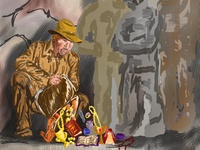The Occupy Museums movement argues that art and valuable objects are not being made freely accessible to the public. As written on the Occupy Museum’s official website, “Galleries and museums increasingly operate as profit-driven business….This system…has emaciated the breadth of art available to the public.” On these grounds, it would be easy, but arguably ignorant, to dismiss collecting.
Ross P. Ford ’12 was last year’s winner of the Philip Hofer Prize for Collecting Books or Art with his collection of coins entitled, “Traveling Art of the British Empire (1884-1947), a Numismatic (Re) Collection.” Ford has been a collector since an early age. His grandfather—an avid collector of coins himself—initiated Ford’s penchant for collecting by encouraging Ford to find the state coins as a child. But despite his personal motivations for collecting, Ford reflects the passion and determination of a collector whose aim is not to hoard objects of value, but to recognize and preserve these objects.
“I like to find things as cheaply as possible, to find something beautiful for nothing,” says Ford. “The market is often so absurd, as people don’t understand the value of things, so I am able to find objects of value at very low prices because their value is not being recognized.”
Ford is not a collector with a limitless budget who shops only at the world’s most expensive auction houses. Rather, he
enjoys hunting for forgotten objects in Goodwill and at street markets, and he relishes the thrill of finding a valuable object for nothing. He illustrates that collecting is not merely reserved for a select few.
FINDING MARIA
Ford sees the activity of collecting as a vital pursuit because, by finding objects of value that have been forgotten, he helps preserve items of historical signifance. It is the act of collecting, of sourcing, recognizing, and acquiring these objects of historical and artistic importance that prevents parts of our historical past falling out of the material record.
Whilst travelling through Europe the summer after his freshman year, Ford stumbled across relics of material history in markets in Istanbul and along the Balkan Peninsula. In Bulgaria, he came across what collectors call a cornerstone: the object that is the unifying piece of the collection. For him, it was the Maria Thaler Dollar silver coin.
The act of collecting can open up areas of historical knowledge previously unknown. Another coin in Ford’s collection bears the face of Englishman James Brooke, who became the first White Rajah of Sarawak. The Brookes—an English family of an army officer— were the rulers of Sarawak for three generations and possessed the power of life and death over their subjects. After discovering this coin, Ford came to learn about the White Rajah dynasty of Sarawak—a startling and intriguing fragment of colonialist history.
Ford’s experience illustrates how objects serve as historical repositories: each a door into a past that may have fallen out of the historical record, or, if not, at least out of our consciousness. Similarly, the new exhibition of Edward Lear in the Houghton Library forces us to remember a crucial part of Edward Lear’s career that often remains forgotten.
VERDEAN VEHICLE
Collections can also function as vehicles of social advocacy. This is exemplified in this year’s winning collection, by Carla Martin, a Ph.D. student in the Department of African and African American Studies and entitled “‘Nos lingua, nos kultura, nos identidadi’ (‘Our language, our culture, our identity’): Books in and about Cape Verdean Creole.”
“Ultimately, this collection, while a source of daily inspiration to my own research and writing, is inherently political in nature,” Martin wrote in an email. Martin has spent the past decade involved in various research and civic engagement projects in Cape Verdean communities. “Its broader implications include potential progressive social development (through education, social enfranchisement, and political participation) for Creole-speaking communities. I strongly believe that it is through the collection and dissemination of Creole language materials that further advocacy work will be made possible,” she wrote.
Martin’s collection includes written texts pertaining to the language of Cape Verde, such as poetry, fiction, children’s storybooks, and non-written or sonic texts such as sheet music. Martin, the U.S. Representative of the National Library of Cape Verde, regards this work as vital, not only to her own individual project, but to making publications from Cape Verde freely available to communities around the world.
“Each year, I organize multiple book fairs in conjunction with cultural events. As a result of these book fairs, members of the United States-based Cape Verdean community now have unprecedented access to these publications,” Martin wrote.
Read more in Arts
Chabon’s Fiction Finds Homelands in ExileRecommended Articles
-
Folk ImplosionIn good old American-Gothic kind of families, a new child was welcomed into the family with a quilt. Mom needlepointed
-
Misusing FundsSILVER CITY, N.M.--John H. Snedeker, former president of Western New Mexico University, has recently been found guilty in state court
-
Undergrads Rewarded for Book CollectionsThree undergraduates who have amassed large literary collections—books on old-time radio, major tomes of Western philosophy and a 1920s-era novel
-
15 Books in FM's Lamont-Worthy CollectionEach year, three lucky Harvard students cash in big—in the most unlikely of ways. The Visiting Committee Prize for Undergraduate ...
-
Lin '10 Left Off All-Star RosterLast year, it took some work, but eventually Jeremy Lin ’10 made the Rookie-Sophomore Challenge at the 2012 All-Star Weekend. ...
-
 "Revenge" Served Cold, Overly Symbolic
"Revenge" Served Cold, Overly Symbolic














